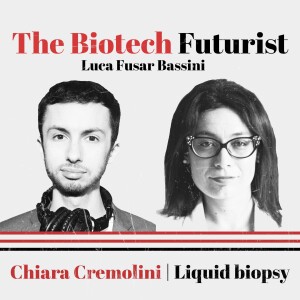
Monday Apr 03, 2023
Clinical Trials In Liquid Biopsy For The Diagnosis, Monitoring, And Stratification of Cancer Patients | Chiara Cremolini
What if we could detect a tumor, monitor for metastasis, and track the response to therapeutics from a simple blood draw instead of an invasive tissue biopsy?
Today I have the pleasure to discuss state-of-the-art liquid biopsy techniques with Professor Chiara Cremolini, who I met virtually during my time in Pisa. Chiara is an Associate Professor in Medical Oncology at the University of Pisa, where she performs translational research, devoted to the care of patients with malignant gastrointestinal cancers.
Chiara and I discuss the revolution brought about by the introduction of liquid biopsy in the cancers field. Liquid biopsy aims to monitor tumors from simple blood draws, to detect their response to treatments, monitor for metastasis after resection, and much more. It is currently based mostly on the analysis of circulating tumor DNA. We analyze a few applications and future possibilities of liquid biopsy for cancers, with a special focus on gastrointestinal tumors, Chiara’s area of expertise. This is also a great occasion to dissect the structure of clinical trials, and explain terms we often hear but fatigue to fully understand, such as primary end points. We put all this in the frame of Chiara’s life as a clinician, researcher, and teacher, to really immerse into what patients’ care in the cancers field looks like from the perspective of a physician, then we move on to study two recent clinical trials that greatly showcase applications of liquid biopsy. One such application is to stratify patients according to liquid biopsy-predicted response to treatments such as chemotherapy, so to spare unnecessary toxic chemotherapies if patients don’t need them, personalizing a field in which historically we could not do much more than standardizing care for very different clinical situations. The second application of liquid biopsy that we describe helps to decide when a patient can receive a second round of monoclonal antibody treatment after their resistance to such treatments has decreased enough. Looking forward to seeing what Chiara and her collaborators achieve in the next few years, but I’m pretty sure they are giving a lot for cancer patients daily, outside of scientific publications and the news!
If you liked this episode, please consider subscribing to The Biotech Futurist on Spotify, Apple Podcast, Stitcher, Google Podcast, or your favorite platform, and leaving a positive review. The growth of this podcast depends critically on word-of-mouth. Thank you for your help. Follow The Biotech Futurist on Instagram and YouTube, and DM or email me if you have any curiosity. You can always download the transcript of this episode and find the links to the papers we mention on my website, lucafusarbassini.com. The jingle is by Gabriele Fusar Bassini.
RESOURCES:
DYNAMIC clinical trial: https://gicancer.org.au/clinical-trial/dynamic-iii/
[ACADEMIC REVIEW] Circulating Tumor DNA Analysis in Colorectal Cancer: From Dream to Reality: https://ascopubs.org/doi/full/10.1200/PO.18.00397
[ACADEMIC] Circulating tumor DNA to guide rechallenge with panitumumab in metastatic colorectal cancer: the phase 2 CHRONOS trial: https://www.nature.com/articles/s41591-022-01886-0
[ACADEMIC] Circulating Tumor DNA Analysis Guiding Adjuvant Therapy in Stage II Colon Cancer: https://www.nejm.org/doi/full/10.1056/NEJMoa2200075
No comments yet. Be the first to say something!